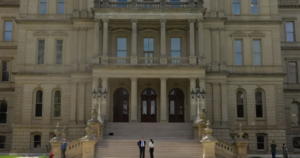Kenya is changing its copyright law. Why this is bad for sports

Kenya’s copyright law is up for change. The proposed amendments seek to increase the proportion of revenue going to content creators, such as musicians. However, they have also caused alarm by seeking to prevent copyright owners from taking down unauthorised creative material on internet platforms. This could result in pirate broadcasters being able to operate without paying for creative material. Law and sports expert Moni Wekesa explains why the amendments undermine their intended purpose.
What does the copyright law say?
As it stands, the Copyright Act protects “creations of the mind”. Such creations include literary works (books, journals, or any other writing); artistic works (sculpture, photography, and the like); music and music performances and broadcasts.
The purpose of this law is to protect the creators of “copyrightable” materials so that they can earn income from their work. To this end, the law protects rights holders for various periods. Anyone attempting to acquire, transmit or re-broadcast protected material is said to be infringing such works. The law provides for various sanctions.
This also applies to internet service providers who are allowed to transmit or temporarily store the protected material – such as live sports broadcasts. They are prevented from modifying or in any way tampering with it. Their role is limited to transmitting from one point to another, or temporarily storing it.
To broadcast such material, one must be licensed. This licence is granted by the national or international sports organisation – for example FIFA or the International Olympic Committee. Rights holders can then generate income from advertising revenue and on-licensing other outlets.
Those who distribute content without licences are known as “pirates”. The Kenyan law – as it is now – allows the owner of rights to ask an internet service provider to “take down” infringing material. “Take down” means the offending material will not be available to be passed on to some intended audience or recipients.
What are the changes proposed to the law?
The amendment Bill has two propositions. The first one is intended to increase the proportion of revenue that creators get from copyrightable products such as music. Many musicians have previously complained of exploitation by middlemen – producers and other entities that collect royalties on their behalf. In some cases they have been paid as little as 20% of the proceeds of their work. Now the bill proposes to cap the creators’ earnings at about 57% of the total earnings. So musicians and other artists can enjoy improved earnings.
The second major amendment seeks to delete legal clauses that empower a rights holder to prevent piracy (theft) of their work. The proposal to repeal these sections makes it difficult for content creators to monitor and enforce sanctions against pirates. This proposal also undoes the good intentions in the first proposal – of increasing the revenue share to rights holders.
Section 35C obliges an internet service provider to cooperate with investigating agencies to find the source of offending materials. This is meant to deter copyright infringement.
Section 35D allows a person whose copyright is being infringed to seek court orders against an internet service provider. The court may order the internet service provider to stop enabling infringement, disable access to the infringing material or prevent the use of its service.
Along with Section 35B, these laws were introduced to help smoke out “pirates” in the digital space. They are serving rights holders well.
Yet the bill proposes to change them. It says the purpose of the amendments is “to remove the ambiguity in the role of internet service provider. Further, it is to align the Act as there are already legal remedies provided for.”
In my view there is no ambiguity. The three sections, read together with the rest of the Copyright Act, form a composite of measures that a rights holder can use against an infringer of their copyright.
Why should the proposed changes worry sporting organisations?
Broadcasting rights are a financial lifeline for national and international sports organisations. Some of this money is then ploughed back into sports development. Broadcasting revenue is also used to fund international meetings in the form of air tickets, accommodation and uniforms.
These organisations license selected broadcasters to beam their events at a fee. For example, it could cost as much as US$100 million to broadcast the Olympics. A broadcaster in Kenya may buy a partial licence for broadcasting the Olympics in Kenya only. Such a broadcaster – having spent probably US$800,000 – will seek to make a profit from advertising to Kenyans. The licence holder can, through local advertising, make three to four times the cost of the partial licence. This way, broadcasting of sporting events is profitable to broadcasters.
Some of the events are broadcast in the night when many people are asleep. It is possible for pirate broadcasters to ‘scavenge’ on the live broadcast by recording it and storing it for re-broadcasting later. They will also seek to make money from local advertisements. Such piracy does interfere with advertising revenue and profits targeted by the main licensee.
Piracy has many effects. Firstly, the local licence holder will lose revenue, and therefore motivation to buy a licence next time. If this happens in many countries, the international sports organiser will lose out eventually. In turn, national sports bodies will not get any money from international bodies. In the long run, sports development can be hampered.
At the local level, there will be no incentive to participate in sports. Athletes will not earn anything or contribute to the economy.
The proposed amendments put sports people, legitimate broadcasters, rights holders and sporting bodies at risk of exploitation by pirates.
What should a fair copyright law be like?
A good copyright law should secure the revenue to be earned by rights holders from copyrightable products. The proposed amendments seek to dilute, if not to obliterate, such earnings by encouraging piracy and making it difficult to catch pirates.
A fair copyright law should retain the sections that are already there to protect copyright in the face of fast changing technologies, including sections 35B, 35C and 35D. In other words, there is a strong case for retaining the law as it is. However, the proposed amendment to increase earnings of content creators and other actors is a welcome improvement to the present law.
This article was originally posted on Kenya is changing its copyright law. Why this is bad for sports







